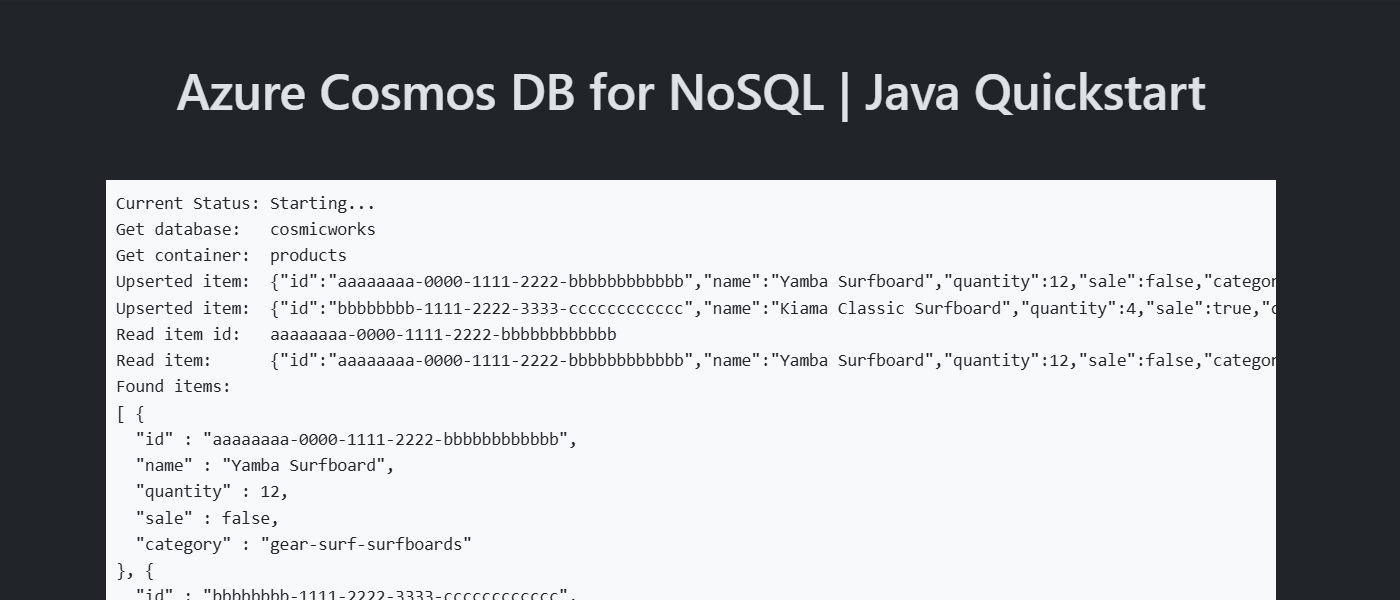在本快速入门中,你将使用用于 Java 的 Azure SDK 部署基本的 Azure Cosmos DB for NoSQL 应用程序。 Azure Cosmos DB for NoSQL 是一种无架构数据存储,允许应用程序在云中存储非结构化数据。 使用用于 Java 的 Azure SDK 查询容器中的数据,并针对单个项执行常见作。
API 参考文档 | 库源代码 | 包 (Maven) | Azure Developer CLI
先决条件
- Azure Developer CLI
- Docker Desktop
- Java 21
如果你没有 Azure 帐户,请在开始之前创建一个试用帐户。
初始化项目
使用 Azure 开发人员 CLI (azd) 创建 Azure Cosmos DB for NoSQL 帐户并部署容器化示例应用程序。 示例应用程序使用客户端库来管理、创建、读取和查询示例数据。
在空目录中打开终端。
如果尚未经过身份验证,请使用
azd auth login向 Azure Developer CLI 进行身份验证。 按照工具指定的步骤,使用首选的 Azure 凭据向 CLI 进行身份验证。azd auth login使用
azd init来初始化项目。azd init --template cosmos-db-nosql-java-quickstart在初始化期间,配置唯一的环境名称。
使用
azd up部署 Azure Cosmos DB 帐户。 Bicep 模板还部署示例 Web 应用程序。azd up在预配过程中,选择订阅、所需位置和目标资源组。 等待预配过程完成。 此过程可能需要大约 5 分钟。
预配 Azure 资源后,输出中将包含正在运行的 Web 应用程序的 URL。
Deploying services (azd deploy) (✓) Done: Deploying service web - Endpoint: <https://[container-app-sub-domain].azurecontainerapps.io> SUCCESS: Your application was provisioned and deployed to Azure in 5 minutes 0 seconds.使用控制台中的 URL 在浏览器中导航到 Web 应用程序。 观察正在运行的应用的输出。

安装客户端库
客户端库可以通过 Maven 作为 azure-spring-data-cosmos 包提供。
导航到
/src/web文件夹并打开“pom.xml”文件。如果它尚不存在,请为
azure-spring-data-cosmos包添加一个条目。<dependency> <groupId>com.azure</groupId> <artifactId>azure-spring-data-cosmos</artifactId> </dependency>此外,如果
azure-identity包尚不存在,请为其添加另一个依赖项。<dependency> <groupId>com.azure</groupId> <artifactId>azure-identity</artifactId> </dependency>
导入库文件
将所有必需的命名空间导入你的应用程序代码。
import com.azure.cosmos.CosmosClientBuilder;
import com.azure.cosmos.models.PartitionKey;
import com.azure.identity.DefaultAzureCredential;
import com.azure.identity.DefaultAzureCredentialBuilder;
import com.azure.spring.data.cosmos.config.AbstractCosmosConfiguration;
import com.azure.spring.data.cosmos.config.CosmosConfig;
import com.azure.spring.data.cosmos.core.mapping.Container;
import com.azure.spring.data.cosmos.core.mapping.PartitionKey;
import com.azure.spring.data.cosmos.repository.CosmosRepository;
import com.azure.spring.data.cosmos.repository.Query;
import com.azure.spring.data.cosmos.repository.config.EnableCosmosRepositories;
对象模型
| Name | Description |
|---|---|
EnableCosmosRepositories |
此类型是用于配置存储库以访问 Azure Cosmos DB for NoSQL 的方法修饰器。 |
CosmosRepository |
此类是主客户端类,用于管理容器中的数据。 |
CosmosClientBuilder |
此类是一个工厂,用于创建供存储库使用的客户端。 |
Query |
此类型是一个方法修饰器,用于指定存储库执行的查询。 |
代码示例
模板中的示例代码使用名为 cosmicworks 的数据库和名为 products 的容器。
products 容器包含每个产品的名称、类别、数量、唯一标识符和销售标志等详细信息。 该容器使用 /category 属性作为逻辑分区键。
对客户端进行身份验证
首先,此示例创建了一个继承自 AbstractCosmosConfiguration 的新类,以配置与 Azure Cosmos DB for NoSQL 的连接。
@Configuration
@EnableCosmosRepositories
public class CosmosConfiguration extends AbstractCosmosConfiguration {
}
在配置类中,此示例创建 CosmosClientBuilder 类的新实例,并使用 DefaultAzureCredential 实例配置身份验证。
@Bean
public CosmosClientBuilder getCosmosClientBuilder() {
DefaultAzureCredential credential = new DefaultAzureCredentialBuilder()
.build();
return new CosmosClientBuilder()
.endpoint("<azure-cosmos-db-nosql-account-endpoint>")
.credential(credential);
}
获取数据库
在配置类中,示例实现了一个方法,用于返回名为 cosmicworks 的现有数据库的名称。
@Override
protected String getDatabaseName() {
return "cosmicworks";
}
获取容器
使用 Container 方法修饰器来配置类以表示容器中的项。 创建类以包含要序列化为 JSON 的所有成员。 在此示例中,该类型具有唯一标识符以及用于类别、名称、数量、价格和清除的字段。
@Container(containerName = "products", autoCreateContainer = false)
public class Item {
private String id;
private String name;
private Integer quantity;
private Boolean sale;
@PartitionKey
private String category;
// Extra members omitted for brevity
}
创建一个项目
使用 repository.save 在容器中创建某个项。
Item item = new Item(
"aaaaaaaa-0000-1111-2222-bbbbbbbbbbbb",
"gear-surf-surfboards",
"Yamba Surfboard",
12,
false
);
Item created_item = repository.save(item);
读取项
同时使用唯一标识符 (id) 和分区键字段来执行点读取操作。 使用 repository.findById 以有效检索特定项。
PartitionKey partitionKey = new PartitionKey("gear-surf-surfboards");
Optional<Item> existing_item = repository.findById("aaaaaaaa-0000-1111-2222-bbbbbbbbbbbb", partitionKey);
if (existing_item.isPresent()) {
// Do something
}
查询项
通过在存储库的接口中定义一个查询,对容器中的多个项执行查询。 此示例使用 Query 方法修饰器来定义执行此参数化查询的方法:
SELECT * FROM products p WHERE p.category = @category
@Repository
public interface ItemRepository extends CosmosRepository<Item, String> {
@Query("SELECT * FROM products p WHERE p.category = @category")
List<Item> getItemsByCategory(@Param("category") String category);
}
使用 repository.getItemsByCategory 提取查询的所有结果。 循环遍历查询结果。
List<Item> items = repository.getItemsByCategory("gear-surf-surfboards");
for (Item item : items) {
// Do something
}
探索您的数据
使用适用于 Azure Cosmos DB 的 Visual Studio Code 扩展来浏览 NoSQL 数据。 可以执行核心数据库操作,这些操作包括但不限于:
- 使用剪贴簿或查询编辑器执行查询
- 修改、更新、创建和删除项
- 从其他源导入批量数据
- 管理数据库和容器
有关详细信息,请参阅如何使用 Visual Studio Code 扩展来浏览 Azure Cosmos DB for NoSQL 数据。
清理资源
不再需要示例应用程序或资源时,请删除相应的部署和所有资源。
azd down